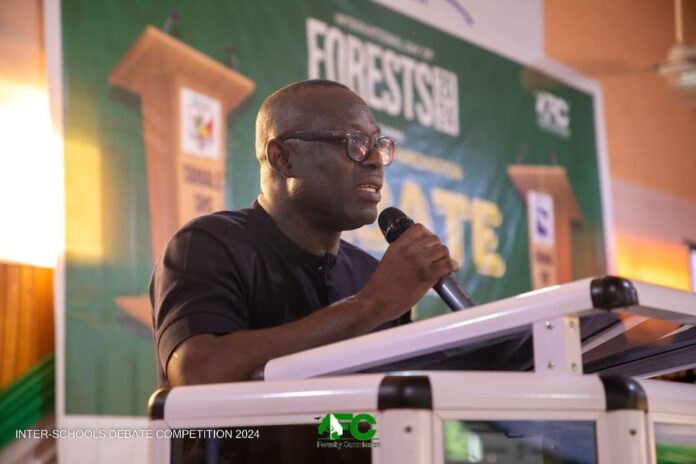The Forestry Commission of Ghana has announced a ban on hunting and capturing of wild animals effective yesterday Thursday August 1, 2024 until December 1, 2024.
The annual ban, which is declared and known as the ‘Close Season’, is in accordance with the Wildlife Conservation Regulation 197, LI 685.
The Forestry Commission annually announces the ‘Close Season’ in order to check the fast decline of wildlife in the country’s forest reserves.
The Forestry Commission has been of the view that the wealth of biodiversity the country has, is being lost due to encroachment, illegal mining, forest degradation, unbridled hunting among other things.
It has been observed that the decline of wildlife in the country must be reversed to sustain human livelihood and Ghana’s heritage.
The Deputy Chief Executive Officer of the Forestry Commission, Mr Sulemana Nyadia Nelson in an address at at a gathering of Chiefs and people of the Busunu Traditional area during the mini launch of the 2024 close season for hunting at Busunu indicated that the time to combat climate change and protect the forest cover and wildlife resources is now since it is not just an environmental issue but a humanitarian crisis that affects everybody.
He said Ghana is blessed with abundant forests and diverse wildlife as it is showcased at the Mole National Park and has been recognized as a custodian of nature’s bounty, adding that we must act now guided by the principles of sustainable forest and wildlife management and conservation since it is the responsibility of custodians of the land to protect and restore the nations resources.
Addressing the gathering under the theme : ‘Wildlife: A Heritage We Must Conserve”, the Savannah Regional minister Mr Saeed Muhazu Jibril indicated that it is very important to protect wildlife species for both present and the future generations since wildlife and biodiversity is not just a natural resource but a critical part of our heritage and livelihood.
He indicated further that the wildlife species play a crucial role in maintaining ecological balance, supporting the Ghanaian economy through tourism and preserving cultural heritage of the various communities.
He lamented that the threats to wildlife especially in the Mole National Park is real since poaching, habitat destruction, climate change and human conflicts are some of the challenges facing the wildlife sector
The Savannah Regional Minister said the close season is the time for everyone to take a decisive decision since it is the period during which hunting and other activities that threaten wildlife are restricted, allowing population to recover and habitats to regenerate, adding that the season is also about awareness creation and education which we must work together to raise awareness about the importance conservation we can take to protect wildlife.
The Paramount Chief of the Busunu Traditional Area, Busunuwura Monasa Jonokpowu in a speech indicated that Busunu is one of the communities that have lost most of it’s communities for the establishment of the Mole National Park and so the Busunu community owes it a big responsibility to ensure that the park is adequately protected against what ever that may affect its operations.
He said government on its part is duty bound to ensure the provision of alternative livelihood system to displaced persons to ward them off the reserve area.
He went further to mention that the Close Season is the period that is observed to provide some briefing space or holidays to poachers and to allow wild animals in both the protected and non protected areas to liter or get extinct.
Busunuwura used the opportunity to express his gratitude to the King abd Overlord of the Gonja Kingdom Yagbonwura Bii-Kunuto Jewu Soale (I) for supporting and implementing the ban on communal hunting in the entire Gonja Kingdom which was amply supported by te Overlord of Dagbon Ndan Ya Na Mahama Abukari (II).
Source: nkilgifmonline.com




